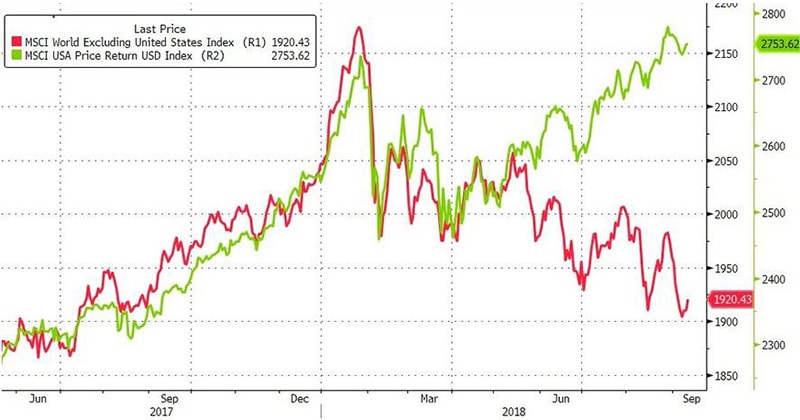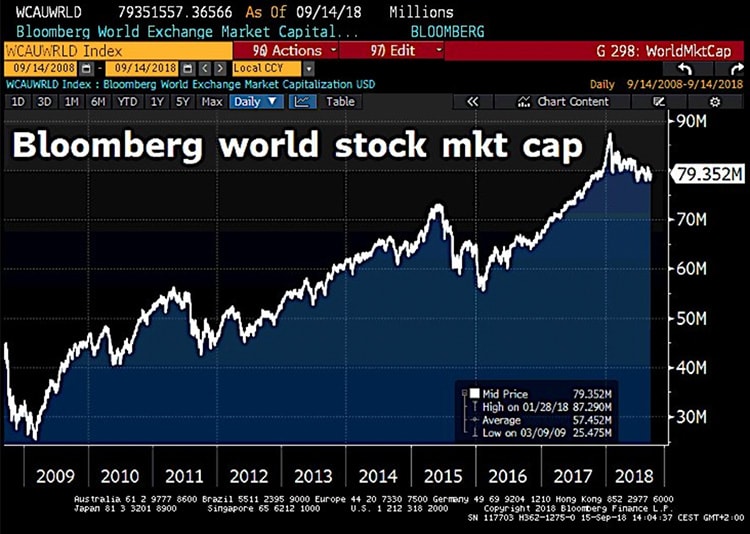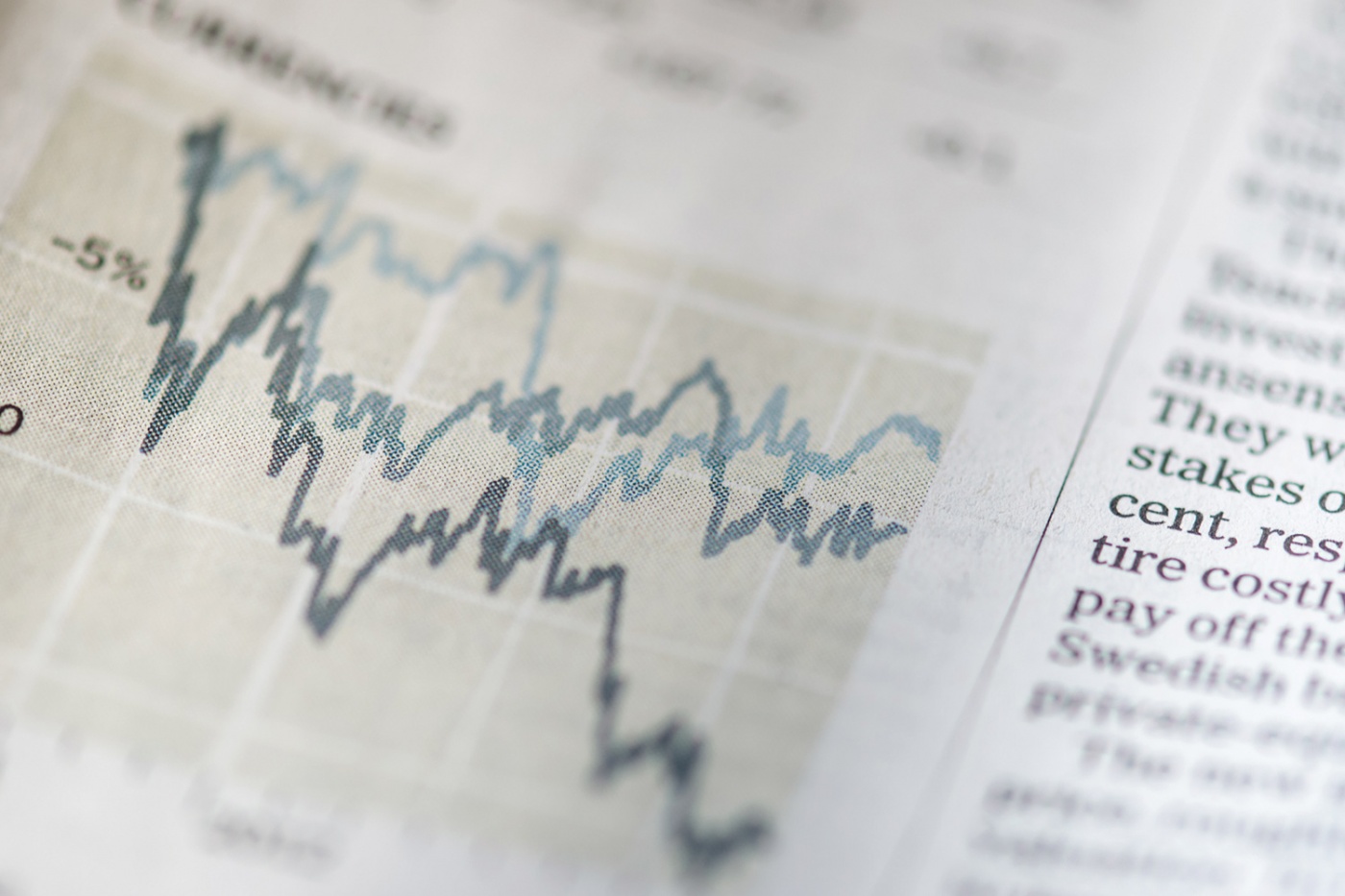Running Out of Ideas a Decade After Lehman Brothers
Why do we have all these 2020 downturn stories and Ray Dalio with a new book, A Template for Understanding Debt Crises, that he is giving away as a free PDF, all calling for an inflection in 2020?
 Source: Bloomberg
Source: Bloomberg
Well, as each day passes, it becomes easier to say we will be seeing a market correction ahead and a recession around the corner because the global economy is riding at its highs, US stock markets roaring away just as central banks are taking back the punch bowl when we are having a mini EM currency rout and trade wars are just starting. A slowdown would be inevitable and a pretty easy call.
What is driving us nuts this week, at least for those not in hurricane or typhoon harms’ way, is the infuriating polarisation between America and the rest of the world (see chart below), that serves to vindicate Trump’s America First ideology.

Price chart of US markets vs World markets; Source: Zerohedge
As markets flip flop between meltdown and euphoria with panic in the moments between the 2 poles, this must be what it feels like to be trapped in an asylum of mental patients on the 10th anniversary of the collapse of Lehman Brothers that brought about the Global Financial Crisis.
The Lehman Crisis Wealth Effect!
It was a crisis that has created much wealth in its aftermath for anyone with financial or social media or certain fintech intellectual capital.
Just imagine US$53.9 trillion in stock market capitalisation created from the low in 2009 till today which includes all the companies that did not exist 10 years ago like Facebook, Twitter, Alibaba and gang which happen to be shoring up the major indices that we look at.
 Chart of World Stock Market Capitalisation in USD 2009-2018, courtesy of Holger Zschaepitz, Twitter
Chart of World Stock Market Capitalisation in USD 2009-2018, courtesy of Holger Zschaepitz, Twitter
Yet, this does not include the real estate wealth created since, or the unicorns that have yet to list or even the Bitcoin crypto world because crypto market cap has halved since end 2017 to a paltry US$204 bio these days.
2017 saw US$ 15 trillion in wealth gained in market capitalisation in accelerated pace (15/53.9 = 27.8% of gains in 1 year) and an estimated US$ 11 trillion in global real estate gains.
The reason why Dalio and the billionaire gang are worried these days is because “A decade after this debacle, the typical middle-class family’s net worth is still more than $40,000 below where it was in 2007, according to the Federal Reserve“, which makes Dalio think that the next downturn “will be more severe in terms of the social, political problems, and think it will be more difficult to handle“.
In the face of such great wealth creation, is it any wonder that more folks more in a hurry than ever to get richer, for the fear of missing out?
That pretty much explains why the mad rush for Turkish assets and the currency after the central bank hiked rates to 24% on Thursday—that is a whopping 24% return? … with a big wink? Or why not Argentina which is at 60% right now?
Revisiting a comment by Melinda Gates, the wife of the second richest man on Earth, on their philanthropic efforts, she said: “we do this work and use whatever influence we have, to help as many people as possible to advance equity around the world”.
The dictionary has several definitions for Equity and the 2 most striking ones would be the following.
Oxford Dictionary‘s definition of Equity is “the quality of being fair and impartial” or “the value of the shares issued by a company.”
We, and Ray Dalio for that matter, are not sure if wealth from definition number 2 is being distributed in the equitable manner of definition number 1.
Let’s Kamikaze Together
We spoke to a retiree at the bar this week who told us he just lost over 600 grand with a hedge fund ran by a friend, and whose strategy he could not articulate to us or probably had not bothered to understand because he had trusted the chap and it struck us that this is how it works for most people— blind faith in trust and a huge dose of greed.
He had wanted returns but if we had told him 2 years back not to go ahead with the investment, we would have done ourselves no favour because we cannot stop people from trying to make more money for themselves.
Then we had lunch with a girlfriend who was mighty upset that her property in the vicinity of Orchard is valued at just 2.5 million dollars (1,900 psf) giving her just a 300 thousand dollar profit from her cost 8 years ago and she expected to have made more, unhappy with her returns, disregarding her capital preserved.
Why should we not stay fully invested like everyone else we know?
As Warren Buffet explained to CNBC this week, ‘People start being interested in something because it’s going up, not because they understand it or anything else. But the guy next door, who they know is dumber than they are, is getting rich and they aren’t. It is so contagious.’
Human, jealousy and greed lead to bubbles and it is unavoidable that another crisis will happen sometime.
Therefore it makes sense for most to stay calm and kamikaze together, hope for the best and still hate your neighbour for making more money than you because he had more capital to start with?
Losing money is easy, but it isn’t simple because everyone starts out not expecting to lose, like my retiree friend.
10 years after Lehman, the markets have all but lost the idea of ever losing (err, we are still in a record bull run for the S&P even if the Hang Seng has fallen into bear territory) because central banks declared war on cash, making it the enemy of capital gains, instilling the FOMO mentality and the need to stay constantly invested or even, over-invested, on leverage.
Running Out of Ideas After 10 Years
Borrowing from a dear friend’s blog, written 10 years ago, a week after Lehman, she had asked, “Could this have been averted? No. Because then, no one would learn anything. And this is the way life works. Lessons would never be learnt and gratitude would never be earned if nobody gets hurt.”
She could well be talking about Mr Retiree last week.
Having read all the blogs and books by the experts and eminent minds, we find we have nothing to say.
The second biggest lesson from Lehman that took us 10 years to learn, is not to be the sourpuss and call for the next big crash in 2012, 2013, 2014, 2015, 2016 and 2017 unless we are billionaires like Ray Dalio, or we are 100% sure it will happen tomorrow.
Dalio, Soros, Buffet and all can say whatever they want because they are still richer than 99.9% of the rest of the world.
Folks will hate you for making them miss out on a single cent and hate you still for being right and end up making a single cent more than them even though there were nothing but long days for those who had bought the S&P 1 day before Lehman collapsed and held it to today to claim they are up 130%.
The biggest lesson has been the recalcitrant trade—cash is the best hedge against risk. And it is good to be cashed up when things get cheap.
The good news these days is that cash is no longer returning zero now that central banks are turning off the taps (bond buying) and raising interest rates too, which means it will be more expensive for someone dumber than you to come along and borrow money to buy that house off you.
It is just too difficult visualising that asset prices will continue to rise when it has been depending on central banks to prop prices up by providing cheap liquidity and low interest rates.
Perhaps the saddest admission after these 10 years, is that we really need another Lehman to give us the next 53.9 trillion dollars worth of wealth for the next 10 years.


